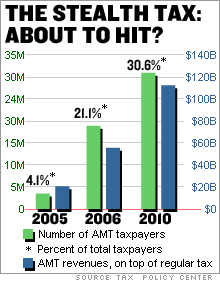 |
| Estimates show AMT on the rise, in terms of numbers of taxpayers hit and as a contributor to government coffers. |
|
|
|
NEW YORK (CNN/Money) -
Even as Congress remained riven over judicial nominations, legislators on Monday took up another impassioned issue and one that seems like a political no-brainer: tax reform for the middle class.
A Senate Finance subcommittee held hearings on the alternative minimum tax, a system intended to ensure that the super-rich pay their fair share but which in practice catches more middle-income taxpayers every year. Critics call it the "stealth" tax.
Senator Charles Grassley, an Iowa Republican and chairman of the Senate Finance Committee, said Monday the AMT should be abolished.
But even as such calls mount, tax experts agree that an overhaul won't be easy as it becomes a bigger source of government revenues each year.
Leonard Burman, a co-director of the Tax Policy Center who spoke to the Senate Finance subcommittee Monday, estimates that the AMT will generate $20 billion in additional income tax revenues in 2005. The extra revenues the government recoups on top of regular income taxes will reach $112 billion in five years, according to Burman.
In light of the bulging federal budget deficit and President Bush's pledge to overhaul the federal income tax code without fattening government coffers, legislators face some tough choices.
"In the end somebody is going to have pay more tax," said John Battaglia, a director at Deloitte Tax who counsels high net worth individuals on tax issues.
Added Mark Luscombe, the principal federal tax analyst with CCH Incorporated: "By 2009 or so the government will be raising more money from the AMT than the regular tax. AMT reform is a difficult challenge."
A nice idea gone bad
The AMT dates to the late 1960s, when Congress learned that some wealthy individual taxpayers were paying zero federal income tax thanks to special loopholes. To close those holes, federal legislators established in 1969 what later became the AMT.
The AMT is a parallel tax structure that adds back in certain deductions allowed under the regular income tax, such as those for state and local taxes.
To know whether they are subject to the AMT, taxpayers must calculate their tax bills twice; if the AMT bill is higher, they pay the difference as a surcharge to their regular tax.
The major problem with the AMT has to do with its exemption levels, which have never been indexed to inflation and now stand at $58,000 for married couples and $40,250 for single taxpayers.
The National Taxpayer Advocate, an agency within the Internal Revenue Service whose job is to represent taxpayer interests, estimates that nearly 3 million taxpayers owed AMT tax this year, paying on average $6,000 more in taxes than they would have paid in regular income taxes.
The numbers caught by the AMT could reach more than 30 million in 2010, according to the Tax Policy Center, a nonpartisan tax policy group based in Washington, D.C. That translates to roughly one in three taxpayers and includes 89 percent of married couples with two or more kids and income of $75,000 to $100,000.
As AMT's reach has grown, so too have calls for its reform -- or even its outright repeal.
A bipartisan, presidential panel charged with recommending this summer ways to make the federal income tax system simpler, more fair and pro-economic growth already have singled out the AMT as ripe for change.
John Breaux, the former Democrat Senator from Louisiana and co-chairman of the President's Advisory Panel on Federal Tax Reform, has called the AMT a "bad" tax. The Tax Policy Center's Burman has called the AMT "untenable" and "irrational."
As despised as the AMT is, tax experts agree that any reform or repeal will require unpopular decisions given the government's growing dependence on the tax and Bush's promise to reform the income tax code without increasing tax revenues or unfairly shifting the tax burden from one group to another.
That said, solutions to the AMT problem exist.
Probably the easiest remedy, at least in theory, would be to abolish the federal income tax code altogether in favor of a national retail sales or similar tax on consumption -- an idea with widespread support among some top Republican leaders and taxpayer groups.
Since the AMT is an income tax, it would disappear in any wholesale shift to a consumption-based scheme.
But if the income tax survives, revenues lost from AMT reform could be offset by higher income tax rates, the elimination of local and state income tax deductions for all taxpayers, or some combination of the two, according to Burman.
Burman, whose testimony Monday was cut short by the Senate battle over judicial nominations, gave federal legislators Monday other AMT reforms to consider, including the removal of special capital gains tax rates now allowed under the AMT.
In an interview after the Senate subcommittee hearing, Burman said AMT reform will be difficult. "If it weren't difficult, it would have been done a long time ago," he said.
Breaux, the former senator who's leading the presidential panel along with former Florida Republican senator Connie Mack, said there are many options, including higher tax rates or the removal of popular deductions as two of many options.
In an interview with Bloomberg Television, Breaux said Monday afternoon that AMT reform or repeal is possible, but will involve "painful" choices. "The question is," said Breaux, "where do you get the money to pay for it?"
Want to read more about where the economy is headed? Clickhere.
Looking for tax help? Click here.

|